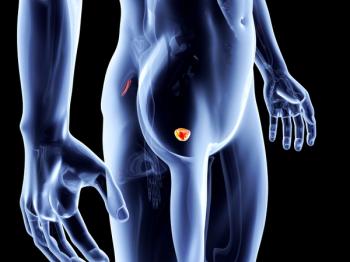
Oncology NEWS International
- Oncology NEWS International Vol 8 No 5
- Volume 8
- Issue 5
Preop Chemo Recommended for Locally Advanced Disease
ORLANDO-The most important aspects in treating locally advanced breast cancer are thorough preoperative chemotherapy and a treatment team that combines chemotherapy, surgery, and radiation, two experts said at a special session of the Society of Surgical Oncology’s Annual Cancer Symposium. The presenters were Frederick C. Ames, MD, of the University of Texas M.D. Anderson Cancer Center, and A. Marilyn Leitch, MD, of the University of Texas Southwestern Medical Center, Dallas.
ORLANDOThe most important aspects in treating locally advanced breast cancer are thorough preoperative chemotherapy and a treatment team that combines chemotherapy, surgery, and radiation, two experts said at a special session of the Society of Surgical Oncologys Annual Cancer Symposium. The presenters were Frederick C. Ames, MD, of the University of Texas M.D. Anderson Cancer Center, and A. Marilyn Leitch, MD, of the University of Texas Southwestern Medical Center, Dallas.
About 10% to 15% of the 200,000 new breast cancers diagnosed each year are thought to be locally advanced, which includes tumors that are large and/or have extensive regional lymph node involvement but do not have distant metastatic spread on initial presentation.
Dr. Ames in particular warned surgeons not to put concern for a theoretical surgical window above adequate preoperative treatment. You do not lose your surgical window by using preoper-ative chemotherapy, Dr. Ames commented. If in doubt, drag your feet. If youre going to lose your surgical window if you dont operate in 6 weeks, you really didnt have one.
The main advantages of preoperative chemotherapy are that it reduces tumor burden prior to surgery and provides immediate treatment of potential systemic disease, he said. Several cycles of a doxorubicin-based regimen such as fluorouracil/doxorubicin/cyclophosphamide (FAC) are typically followed by surgery and/or radiotherapy, then by more chemotherapy.
Combined modality treatment is advised even for patients with apparently very limited disease at presentation or with ulcerated lesions at presentation. Dr. Leitch said that all locally advanced breast cancer patients should be seen upfront by a medical oncologist, a radiation oncologist, and a surgical oncologist, so everybody is on the same page about how they are going to handle the patient.
The question of how many cycles of preoperative chemotherapy to give came in for considerable discussion. Dr. Ames advised using at least three cycles of preoperative chemotherapy before declaring a failure, but not more than four.
He also urged clinicians to use radiographically detectable markers and ultrasound or mammographic localization to document results in patients who are in apparent complete remission (CR) after induction and to document lymph node status histologically. Half of the patients you think have a clinical CR do not, he warned.
Dr. Ames said that patients who have 50% or greater tumor reduction in response to induction chemotherapy and who have negative axillary nodes on ultrasound and on clinical examination are likely to have only microscopic disease in the axilla, but patients who do not have at least a 50% response to induction chemotherapy are poorer risks.
Sentinel lymph node examination is being tested as a method for monitoring response to induction chemotherapy and may show promise coupled with a less-than-standard axillary dissection. However, Dr. Ames said that there have been problems in identifying adequate sentinel nodes after induction chemotherapy. He suspects that larger areas of disease may reduce the probability that adequate sentinel nodes can be mapped, perhaps because of poor dye diffusion.
Preoperative chemotherapy is particularly important in patients with ulcerated lesions, which can be very intimidating, Dr. Leitch said. She has found that even extremely large and complex ulcerated locally advanced breast cancers often become operable after a course of preoperative chemotherapy.
Dr. Leitchs approach in such cases is to begin by debriding dead tissue, but not doing aggressive debridement, which can get you into trouble, she said. She then applies povidone iodine solution and a nonadherent dressing and gives metronidazole by mouth.
The patient is then given one or more cycles of a standard preoperative chemotherapy regimen. Dr. Leitch has found that many patients with ulcerated locally advanced breast cancer will improve and become operable after chemotherapy.
Both surgeons reported increased interest among patients with locally advanced disease in the possibility of breast conservation surgery or immediate reconstruction after mastectomy.
Dr. Ames recommended that breast conservation be offered only to patients who, after induction chemotherapy, have complete resolution of skin edema, residual tumor smaller than 5 cm (and preferably smaller than 3 cm), no extensive intramammary lymphatic invasion, no extensive microcalcification, and no multicentricity. Any type of residual skin edema is seen as a particularly bad prognostic sign.
Dr. Ames said that immediate reconstruction should be undertaken only after consulting with the radiation oncologist to assure that reconstruction will not interfere with postoperative radiation therapy. Radiation and reconstruction sometimes dont coexist very well, he said.
Dr. Leitch added that patients with other medical conditions such as diabetes and obesity can have increased complications with reconstructive surgery that can delay the overall treatment plan for postoperative chemotherapy/radiation.
Articles in this issue
almost 27 years ago
Delirium Is Often Misdiagnosed in Advanced Canceralmost 27 years ago
High Degree of Variability in HIV Testing Throughout the USalmost 27 years ago
Physicians Need ‘Coherent Game Plan’ for Care of Dyingalmost 27 years ago
NCI Funds Pediatric Brain Tumor Consortiumalmost 27 years ago
Marketing Your Cancer Center to Today’s Savvy Consumersalmost 27 years ago
Axillary Irradiation Can Replace Dissection in Some Breast Cancer’salmost 27 years ago
Dr. Bailes Urges Oncologists to Act Against APC Proposalalmost 27 years ago
Elective Lymph Node Dissection Supported in Some Melanomasalmost 27 years ago
Broad Coalition of Health Care Groups Opposes APCsalmost 27 years ago
Depression and Anxiety Difficult to Diagnose in Cancer PatientsNewsletter
Stay up to date on recent advances in the multidisciplinary approach to cancer.













































